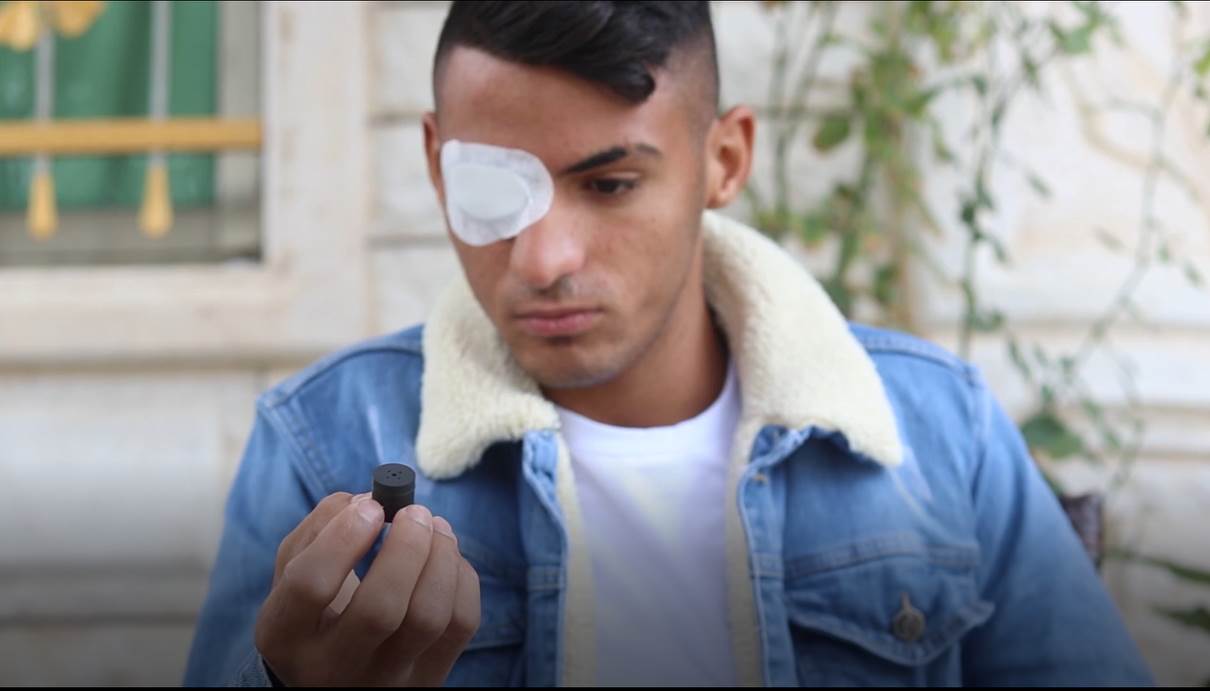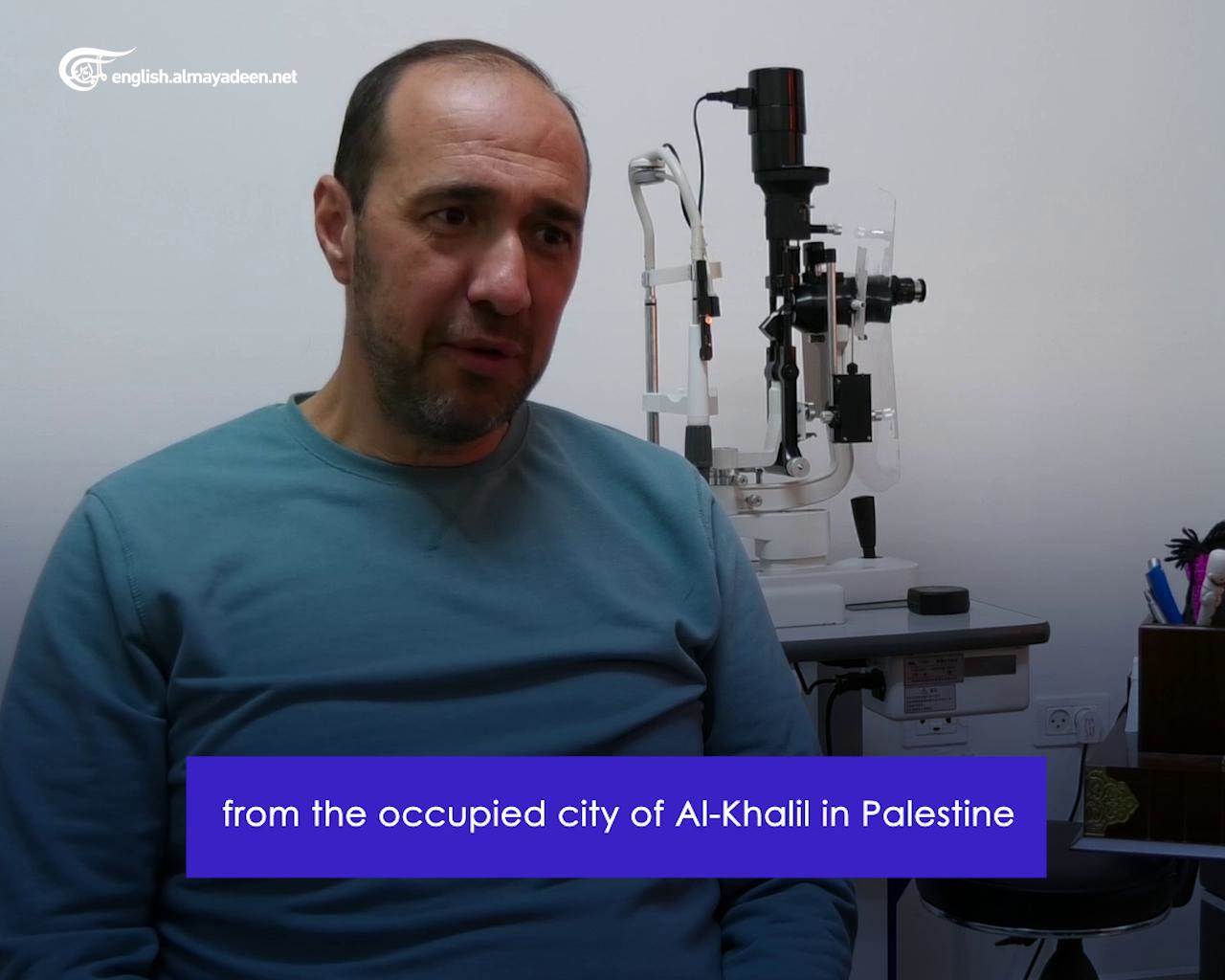“'Israel' Ripped My Eye Out; I Want it Back”
Palestinian and international activists, doctors, and journalists note a worrying “trend”; Israeli occupation forces are intentionally targeting Palestinians’ eyes.
-

19-year-old Palestinian Fayez Hamed: The medical staff found that the bullet was metal and rubber-coated.
At least 50 Palestinians had one or both eyes gouged out when Israeli occupation forces intentionally shot live or rubber-coated metal bullets at them during the past three years only, according to Palestinian civil organizations.
Since 1948, “Israel” has sought all tools to control and destroy the Palestinians, whether by committing murders or leaving them disabled, psychologically, practically, and socially. Meanwhile, the Palestinian society has repeatedly demonstrated support for those injured by the Israeli occupation’s bullets at various levels.
Israeli occupation forces assault Palestinians on a daily basis and for no reason whatsoever; Palestinians could be protesting forced evictions or performing prayers at the al-Aqsa mosque in al-Quds; they could be heading to work, school, or agricultural land; they could be women, men, or children; they could be journalists and activists.
The Palestinian journalist's eye
-

Palestinian photojournalist Muath Amarneh lost sight in one eye after being shot by Israeli police (AFP)
In 2019, a Palestinian press photographer Muath Amarneh was blinded in one eye after being shot by Israeli occupation forces when he was covering Israeli violations against Palestinians in al-Khalil, igniting international outrage on social media and sparking solidarity protests across Palestine.
In solidarity with Muath Amarneh, the Palestinian journalist who was shot by Israeli focus with a rubber bullet in his left eye even though he was wearing his press helmet and vest Targeting and shooting journalists violates international law. #eyeoftruth pic.twitter.com/dKxMgY8VCH
— Harvard PSC (@HarvardPSC) November 25, 2019
Read More: “It Is Fun to Shoot Palestinians”: Six Former Israeli Soldiers Speak Up
Muath Amarneh told Al Mayadeen English that the moment he got shot is “a haunting memory” that he keeps recollecting.
“I always think about how I survived. I think being alive is a miracle.”
The young passionate photographer divulged that his life shifted 180 degrees.
“I was such an outgoing person then after my injury, I became indolent.”
It took him two whole years to declare he was finally recovered, physically, yet the emotional harm lingered.
The photographer related his difficult recovery journey to Al Mayadeen English, stressing that his biggest challenge was to hold his camera and film again.
"It was difficult at the beginning. Every time I held my camera and wanted to take a picture, I recall the moment I got shot. You can say I developed a phobia. After several attempts, I was resilient, overcoming the psychological barrier. I am filming again”, he added.
The field journalist recalled witnessing uncountable Israeli shootings of unarmed Palestinians.
“Two incidents I could never forget. The first is when a young Palestinian man was martyred right next to me near “Beit El”, an Israeli-occupied Palestinian territory. The second is when a young man was shot in his shoulder and the bullet came out from his neck,” he emotionally stated.
Muath also stressed that local and international journalists have been intentionally and brutally targeted several times by the Israeli occupation forces.
The young Palestinian's eye
19-year-old Fayez Hamed Abdullah Bani Mufleh from the village of Beita is the latest victim of Israeli brutality, whereby he lost an eye. Fayez was injured on Friday, November 5 of this year. That day, he went to Kharbatha al Misbah, a Palestinian village in the Ramallah Governorate area, to perform the Friday prayer, and then he participated in a peaceful protest in Jabal Sbeih.
The protest was nearly 150 meters away from the Israeli occupation forces, and suddenly, the Israeli occupation forces started firing tear gas canisters at the protesters, Fayez recalls.
In an exclusive interview for Al Mayadeen English, Fayez said that the elderly protesters retreated and the younger men advanced, thus getting closer to the Israeli occupation soldiers, with only a few hundred meters left away from them.
“At that time, violent confrontations broke out between us and them. They fired more tear gas canisters at us, and we threw them back at them. They fired rubber bullets at us, but no one was hurt,” he added.
“At 2:30 pm, the Israeli occupation soldiers hit me in the right eye. I was taking shelter behind a berm. One soldier sneaked toward us, but at first, I couldn't see him because he eventually hid behind an olive tree, about 70 meters away,” he emotionally stated.
"As soon as I noticed his presence when I turned to the right, he fired rubber bullets directly at me, and one of the bullets hit me right in the eye. "
"I lost my eye, and of course, my eyesight due to the shot."
Fayez still remembers every detail of the scene. He told Al Mayadeen English that fellow protesters carried him on their shoulders for nearly 2 kilometers until they reached the first ambulance.
“The road was destroyed. An occupation bulldozer had razed the road a day before. The ambulance took me from the Kharbatha al Misbah to the field hospital in the area.”
The resilient young Palestinian said that one of the nurses in the hospital assisted him with first aid, and he was then transferred to an-Najaj Hospital where he had urgent eye surgery to remove the bullet from his eye.
“The surgery lasted 2 hours and a half. The medical staff found that the bullet was metal and rubber-coated. They had to take my right eye out. I could no longer see, and it gave me herpetic sores in my eye socket.”
When asked if his injury will prevent him from fighting the Israeli occupation, Fayez replied that he refuses to even think about ceasing to confront the occupation and its oppression or to retract his position.
“My subconscious mind rejects this completely. The issue became a matter of survival. It is now a question of existence. In the long run, it is a doctrinal matter. We will not leave our homes in Jabal Sbeih. The israeli occupation should know that this is impossible. All harassment and repressive measures against us will not affect our position.”
He stressed that Palestinians will not leave their homes and land in Jabal Sbeih, no matter what the Israeli occupation does and whatever happens.
“The occupation must know that using bullets against us will not help, and suppressed protesters will engage once again in the resistance once they recover. They will be at the frontlines of the struggle to defend their rights in the face of the occupation.”
The Palestinian child's eye
-

Izz al-Din al-Batash is still unsure what happened to his eye.
Last April, a 14-year-old Palestinian boy was shot in the eye with an Israeli bullet as he stood at the entrance of the vegetable store where he worked in the heart of al-Khalil. The Israeli occupation forces just stood there and watched the agonized boy without providing him with first aid. He had to wait for 11 hours before being hospitalized. He is now half-blind.
Izz al-Din al-Batash is still unsure what happened to his eye. His parents are too afraid to tell him what the bandages are hiding. He may have removed them in secret and noticed the gaping hole.
The child says that he has a lot of ambition and dreams he wanted to achieve in life, but they have all gone unheeded.
"Israel' ripped my eye out, I want it back. Let them find a way to get my eye back."
The Palestinian doctor
Dr. Farouk Issa Ashour, Ph.D. in ophthalmology, from the occupied city of al-Khalil in Palestine, told Al Mayadeen English that the eye is a "precious jewel" in the human body, and perhaps one of the most precious possessions of a human.
“The truth is that the occupation always tries to target the most precious possession of the Palestinian, whether by depriving him of his freedom, occupying his homeland, or injuring the most sensitive and important areas of his body, especially the eye. If the occupation is not able to extract his soul, then at least it targets what is most valuable to him, and the eye is the most sensitive organ targeted by the Israeli occupation soldiers,” he tersely stressed.
The doctor stated that he has experienced many eye injuries and has dealt with many similar cases.
Dr. Farouk said that such injuries are very painful since they largely affect the psyche of the injured, causing him real harm, hindering his life, leading to permanent disability, and affecting his work in all aspects of life.
"There is no doubt that the Palestinian is innately resilient and resistant, and he would not have been able to confront the occupation had it not been for his pride, determination, and strength", he affirmed.
"This determination will not cease as long as the heart of a Palestinian continues to beat and he continues to breathe. His fight will not end despite the injuries inflicted on him by the oppression. Although his injuries are physically and emotionally painful, his fight persists nevertheless".
The Palestinian doctor added that even when he breaks the news to the injured Palestinians that they have lost their eyes or sight, they accept their fate with patience and determination because this is the nature of the Palestinian.
"Palestinians remain resistant, and they do not show the occupation any signs of disability or weakness. And this will remain so until the whole of Palestine becomes free and independent. The day of liberation will come soon, God willing", he concluded.

 8 Min Read
8 Min Read














